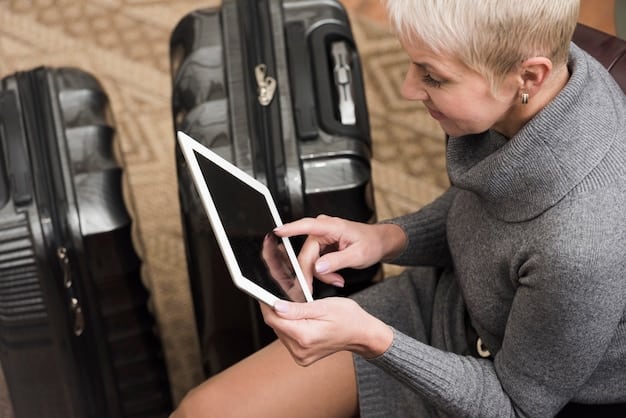New Federal Airline Baggage Fee Rules by Jan 2025

Anúncios
New federal regulations concerning airline baggage fees are set to take effect by January 2025, aiming to increase transparency and protect consumers from hidden charges, requiring airlines to disclose all optional fees upfront when displaying flight prices.
Anúncios
For many travelers, the experience of booking a flight often comes with a subtle dread: the moment when additional fees for baggage suddenly inflate the advertised price. This common frustration has long been a point of contention for consumers, leading to calls for greater clarity and fairness. Now, significant changes are on the horizon. New Federal Regulations on Airline Baggage Fees: What Travelers Need to Know by January 2025 aims to fundamentally alter how these charges are presented, promising a more transparent and predictable booking process for everyone.
Understanding the Core of the New Regulations
The landscape of airline travel is constantly evolving, and a major shift is underway regarding baggage fees. These new federal regulations are not merely minor tweaks; they represent a significant push towards consumer protection and transparency. Essentially, the core of these rules mandates that airlines must disclose all ancillary fees, particularly baggage fees, upfront and clearly whenever a flight price is displayed. This means no more surprises at the final checkout screen.
Why are these regulations necessary?
For years, airlines have benefited from a business model that allows them to advertise lower base fares, then incrementally add charges for services like checked bags, seat selection, and even carry-on bags on some budget carriers. This practice, often referred to as “drip pricing,” has led to considerable consumer dissatisfaction. Travelers often feel misled, discovering the true cost of their journey only late in the booking process, making price comparisons difficult and frustrating.
Anúncios
- Increased Price Transparency: Ensures travelers see the full cost of their ticket, including baggage, from the outset.
- Empowered Consumer Choices: Allows for more informed decisions and easier comparison shopping across different airlines.
- Reduced Hidden Fees: Aims to eliminate the “gotcha” moments when unexpected charges appear.
These regulations are a direct response to public outcry and years of advocacy from consumer protection groups. The goal is to level the playing field, making it easier for travelers to budget and plan their trips without encountering unforeseen financial hurdles. The U.S. Department of Transportation (DOT) has been instrumental in pushing these changes, asserting that clear pricing is a fundamental right for consumers.
The implementation of these rules by January 2025 provides airlines with a timeframe to adjust their systems and processes. This period is crucial for airlines to update their websites, booking platforms, and training materials to comply with the new disclosure requirements. For travelers, it means a more streamlined and honest approach to airfare pricing is on the horizon, allowing for greater confidence in the booking process. The shift is expected to foster a more competitive environment where airlines are judged not just on their base fares, but on their all-inclusive pricing.
Key Changes and How They Impact Travelers
The new federal regulations sweeping through the airline industry are set to fundamentally alter the booking experience, particularly concerning baggage fees. These changes prioritize clarity and upfront communication, moving away from a system riddled with hidden costs and last-minute surprises. By January 2025, travelers should experience a noticeable difference in how flight prices are presented and understood.
One of the most significant changes is the requirement for airlines to clearly display baggage fees at the initial point of sale. This isn’t just about a small footnote; it means that when you search for a flight, the cost associated with carrying luggage—whether carry-on or checked—must be readily available alongside the base fare. This immediate visibility is intended to give travelers a more accurate picture of their total travel expenses before they commit to a purchase.
Enhanced Comparison Shopping
The implications for comparison shopping are substantial. In the past, finding the best deal often involved navigating multiple airline websites, adding flights to carts, and getting to the final payment page to uncover the full suite of fees. With the new rules, consumers can expect to compare flight options on a level playing field, knowing that the advertised price will be much closer to the final cost, inclusive of essential baggage.
- Upfront Fee Disclosure: All optional fees, including for first and second checked bags, and carry-ons where applicable, must be shown.
- Consistent Information Across Channels: Fees must be displayed equally on airline websites, online travel agencies (OTAs), and third-party booking platforms.
- Refundability of Fees: Changes also address circumstances under which baggage fees might be refundable, providing additional consumer protections.
This proactive disclosure helps travelers make more informed decisions about which airline offers the best value for their specific needs. For instance, an airline with a slightly higher base fare but inclusive baggage might suddenly appear more attractive than a budget carrier with numerous add-on fees.
Furthermore, the regulations extend beyond just the initial booking. They aim to simplify the process of understanding baggage policies throughout the travel journey, including changes, cancellations, and delays. This holistic approach ensures that travelers are not only aware of fees upfront but also understand their rights and the airline’s responsibilities concerning their luggage at every stage. This comprehensive approach is designed to reduce consumer confusion and dispute, making air travel a more predictable and less stressful experience for everyone.
Navigating Baggage Fee Policies Post-Regulation
As the January 2025 deadline approaches for the new federal regulations on airline baggage fees, travelers are preparing for a more transparent booking experience. However, understanding the nuances of these updated policies will still be critical to avoid unexpected costs. While the new rules mandate upfront disclosure, the specific fee structures will still vary significantly between airlines.
Travelers will need to pay close attention to the details provided by each carrier during the booking process. Airlines might still offer different tiers of fares, some of which could include baggage allowances while others do not. The crucial difference under the new regulations is that these options and their associated costs must be overtly visible from the initial displayed price, removing guesswork and unexpected additions at checkout.
Tips for Travelers in the New Landscape
Even with increased transparency, consumer vigilance remains important. It’s advisable to cross-reference the baggage policy details directly on the airline’s official website, especially if booking through a third-party site. While the regulations aim for consistency across all sales channels, minor discrepancies or specific conditions might still exist.
- Review Fare Classes Carefully: Understand if your selected fare class includes baggage or if it’s an optional add-on.
- Check Airline Websites: Verify baggage allowances and fees directly on the airline’s official site for the most accurate information.
- Consider Loyalty Programs: Elite status or co-branded credit cards often offer complimentary baggage, which can mitigate fees.
- Understand Weight and Size Limits: Be aware that exceeding these limits will almost certainly incur additional, often hefty, charges.
Passengers should also be aware that the regulations primarily focus on the disclosure of fees, not necessarily on capping their amounts. Airlines will still retain the flexibility to set their own baggage fees, meaning that while transparency improves, the cost itself might still vary widely among carriers and routes. This reinforces the need for effective comparison shopping that now, thankfully, will be much easier to conduct.
In essence, the new regulations empower travelers with better information from the start. This allows for a more accurate comparison of true travel costs and informed decision-making. Travelers should embrace this new era by proactively utilizing the clearer information provided to make the most cost-effective choices for their journeys. The onus shifts slightly from uncovering hidden fees to actively understanding and comparing transparently presented options.
Consumer Rights and Recourse Under the New Rules
The implementation of the new federal regulations on airline baggage fees by January 2025 marks a significant win for consumer rights. These rules are designed to protect travelers from deceptive pricing practices and ensure they are fully aware of all costs associated with their flight tickets from the very beginning. Understanding your rights under these new provisions is crucial for a smoother travel experience and for seeking recourse if an airline fails to comply.
One of the primary tenets of the new regulations is the right to clear and transparent pricing. This means airlines are legally obligated to display all mandatory and optional charges, including baggage fees, upfront whenever a flight fare is quoted. If an airline attempts to charge you an undisclosed baggage fee that was not presented during the initial booking process, you now have a stronger basis for dispute.
What to do if an airline doesn’t comply?
While the regulations aim to prevent such scenarios, instances of non-compliance might still occur. Travelers who believe an airline has violated these disclosure rules have several avenues for recourse. The U.S. Department of Transportation (DOT) is the primary regulatory body overseeing these matters and serves as the official channel for consumer complaints.
- Document Everything: Keep screenshots of booking pages, email confirmations, and any communication with the airline that shows fee discrepancies.
- Contact the Airline Directly: Attempt to resolve the issue with the airline’s customer service first, clearly stating the discrepancy based on the new regulations.
- File a Complaint with the DOT: If direct resolution fails, submit a formal complaint through the Department of Transportation’s Aviation Consumer Protection Division.
The DOT takes consumer complaints seriously and investigates patterns of non-compliance, which can lead to fines and enforcement actions against airlines. Your complaint contributes to the regulatory body’s understanding of systemic issues and helps ensure that airlines adhere to the new standards.
Furthermore, the regulations may also impact the refundability of baggage fees under certain circumstances, for instance, if a bag is lost or significantly delayed. While specific details will be fleshed out, the general thrust is towards greater accountability for airlines regarding the services they charge for. Therefore, knowing your rights not only aids in personal recourse but also contributes to collective consumer protection, forcing airlines to operate with higher standards of transparency and fairness in their long-term practices.
Future Outlook: Beyond Baggage Fees
The new federal regulations on airline baggage fees, set to be fully implemented by January 2025, represent a significant step in consumer protection, but they are also indicative of a broader trend within the airline industry. This move towards greater transparency in ancillary fees is unlikely to stop at just baggage; it signals a potential shift towards more comprehensive disclosures across various optional services.
Regulators and consumer advocates are increasingly scrutinizing the “unbundling” of airfares, which has allowed airlines to advertise very low base prices while generating substantial revenue from add-on services. While these services provide consumer choice, the lack of upfront and clear pricing has been a major point of contention. The success of the baggage fee regulations could pave the way for similar rules applying to other common ancillary charges.
Potential Areas for Future Regulation
The focus on transparent pricing might expand to include other fees that passengers often encounter during the booking or travel process. This could encompass charges for seat selection, especially for standard seats, or even fees associated with changing or canceling a flight. The aim would be to provide a full, accurate picture of the total cost before the purchase decision is made.
- Seat Selection Fees: Mandating upfront disclosure of costs for choosing standard seats.
- Change and Cancellation Fees: Requiring clear presentation of penalties for itinerary modifications.
- In-flight Services: While less likely to be regulated, the trend could influence how these are advertised.
- Wi-Fi and Entertainment: Greater transparency regarding the availability and cost of connectivity and media.
This evolving regulatory environment suggests a future where consumers have more power and clearer information. Airlines, in turn, will need to adapt their business models to compete on a more holistic price rather than just the lowest advertised fare. This could lead to a simplification of fare structures or a more integrated approach to pricing, where certain common services are bundled into higher-tier fares.
The overarching goal is to foster an environment where airlines compete fairly on price and service quality, and where the consumer is fully aware of what they are paying for. These regulations are not just about baggage; they are about setting a precedent for consumer-centric practices across the travel industry, promising a more honest and predictable flying experience in the years to come. The industry’s response to these initial regulations will likely inform the scope and pace of any future regulatory actions.
Preparing for the 2025 Deadline: A Checklist for Travelers
With the January 2025 deadline for new federal regulations on airline baggage fees fast approaching, proactive preparation can make a significant difference in your future travel experiences. These regulations aim to enhance transparency, but the onus is still on the traveler to understand and leverage the new information effectively. Being prepared means knowing what to look for and how to adapt your booking habits.
First and foremost, familiarize yourself with the core purpose of the regulations: that airlines must disclose all baggage fees clearly and upfront when displaying flight prices. This means the days of discovering hefty checked bag fees only at the very end of the booking process should be over. Your checklist should begin with actively observing how airlines present their fares.
Essential Steps for a Smoother Booking Process
As airlines update their systems to comply, take the time to notice the changes on their websites and through online travel agencies. Look for dedicated sections on baggage policies, typically found during the flight selection phase, that explicitly state fees for carry-on and checked luggage based on the fare class you select.
- Bookmark Key Airline Baggage Policy Pages: Many airlines have dedicated pages outlining their fees; review these periodically.
- Compare “All-in” Prices: Don’t just look at the base fare; actively compare the total cost, including baggage, across different airlines from the start.
- Pack Smart: Consider if carry-on only is feasible to avoid checked bag fees, or factor those costs into your budget from the outset.
- Utilize Travel Rewards: If you have airline credit cards or elite status, confirm how these benefits apply to the new fee disclosures.
Beyond just baggage fees, also be mindful of other ancillary services that might eventually come under similar transparency scrutiny. While direct regulation outside of baggage is not confirmed, the trend is towards greater disclosure across all optional charges. This includes everything from seat selection to in-flight amenities.
Ultimately, preparing for the 2025 deadline involves becoming a more informed and active consumer. The new regulations provide the tools for greater clarity, but it’s up to you to use them. By adopting a proactive approach to understanding airline policies and comparing all-inclusive fares, you can ensure your travel planning is not only transparent but also as cost-effective as possible. This shift marks a positive step towards more honest and predictable air travel for consumers across the federal system.
| Key Point | Brief Description |
|---|---|
| ✈️ Transparency Mandate | Airlines must disclose all optional baggage fees upfront when displaying flight prices. |
| 🗓️ January 2025 Deadline | Regulations are set to be fully implemented by this date, changing how you book. |
| 💡 Informed Decisions | Empowers travelers to compare true costs and make better choices, reducing surprise fees. |
| ⚖️ Consumer Recourse | Stronger grounds to dispute undisclosed fees via DOT complaints. |

Frequently Asked Questions About New Baggage Fee Regulations
The main objective is to enhance transparency for consumers. Airlines will be required to disclose all baggage fees upfront, at the initial display of a flight price, preventing hidden charges and enabling travelers to see the full cost of their journey before booking. This aims to reduce consumer frustration and improve comparison shopping.
Airlines must comply with the new federal regulations on baggage fees by January 2025. This timeframe allows carriers to update their booking systems, websites, and third-party platform integrations to reflect the updated disclosure requirements, ensuring a smoother transition for both the industry and consumers.
No, the new regulations primarily focus on the disclosure of fees, not their standardization or capping. Airlines generally retain the flexibility to set their own baggage fee amounts. The key change is that these fees, whatever they may be, must be clearly and prominently displayed upfront, allowing for better informed consumer choices.
The regulations apply across all sales channels, including airline websites, OTAs, and other third-party booking platforms. This means that whether you book directly with an airline or through an OTA, you should see clear and upfront disclosures of baggage fees, ensuring consistent pricing information regardless of where you purchase your ticket.
If you encounter an airline that fails to disclose baggage fees upfront as required, first attempt to resolve the issue directly with the airline’s customer service. If unsuccessful, you can file a formal complaint with the U.S. Department of Transportation (DOT) via their Aviation Consumer Protection Division. Documenting the discrepancy will aid your complaint.

Conclusion
The impending implementation of new federal regulations on airline baggage fees by January 2025 marks a transformative moment for air travel. These rules are a decisive victory for consumers, ushering in an era of unprecedented transparency in airline pricing. By mandating upfront disclosure of all baggage-related costs, the U.S. Department of Transportation is addressing a long-standing grievance, empowering travelers to make more informed decisions and fostering a fairer competitive environment among carriers. This shift not only eliminates the frustration of hidden fees but also sets a precedent for potential future reforms in ancillary charges, promising a more honest and predictable booking experience across the board. The proactive traveler, equipped with this newfound clarity, stands to benefit immensely, ensuring their journeys are not only planned but also paid for with full awareness and confidence.





